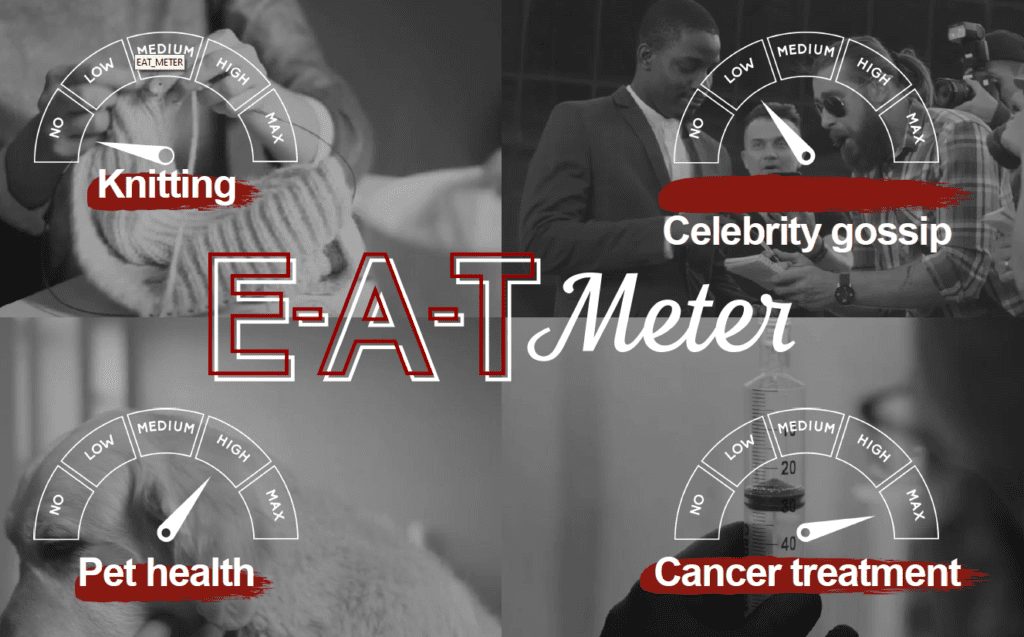Jump to: FAQ about E-E-A-T | Videos | Articles | Conference Decks | Webinars | Podcasts
E-E-A-T stands for experience, expertise, authoritativeness, and trustworthiness.
E-E-A-T is an acronym created by Google in its Search Quality Guidelines and is used throughout that document as the criteria evaluators use to assess the quality and credibility of content.
Note: Google updated the acronym E-A-T (expertise, authoritativeness and trustworthiness) to E-E-A-T in December 2022. The new addition of the letter E stands for Experience. Google also stated that the T – trust – is the most important member of the E-E-A-T family.
Frequently Asked Questions about E-E-A-T:
In Google’s Search Quality Guidelines, Google defines E-E-A-T as the level of expertise, authoritativeness, and trustworthiness of the creator of the main content; the main content itself, and the website. E-E-A-T is more important for websites that are classified as YMYL (your money, your life).
YMYL is another acronym from Google’s Search Quality Guidelines, which stands for Your Money, Your Life. Examples of YMYL topics or pages are ones that can impact a person’s future happiness, health, financial stability, or safety.
E-E-A-T is the criteria Google’s search quality evaluators use when they evaluate search results during the 380,000+ quality evaluations Google conducts every year with over 10,000 human quality raters. Google trains these raters on the specific criteria they are looking for with good or bad content quality and E-E-A-T.
The raters’ feedback is then incorporated into Google’s future algorithms, although it’s important to understand that the raters’ scoring does not directly influence Google’s results; but rather, in aggregate, Google uses their feedback as data points that helps ensure that the content surfaced by their algorithms is in line with what humans would expect from high-quality search results.
The volatility in Google’s organic search results starting with the Medic Update of August 1, 2018, appears to be tied closely to Google’s emphasis on E-E-A-T. Google’s core updates of the past 2 years have disproportionately impacted YMYL (your money, your life) websites and content, especially in cases where that content was lacking sufficient E-E-A-T.
Many sites whose content contains medical, financial, or legal advice saw big traffic declines between 2018 and 2020 as Google’s search results adjusted to surface only the highest-quality, most authoritative and trustworthy content. As a result of these changes to Google’s algorithms, many brands have made the focus on E-E-A-T a primary part of their SEO strategies to be able to stay competitive in SEO.
No, Google has confirmed there is no specific score for E-E-A-T or YMYL. My article about common E-E-A-T myths and misconceptions elaborates further on this topic.
The main goal of optimizing for E-A-T is to make the good qualities about your brand, your leadership, your experts, and the people who write for you as prominent as possible on the website. This helps to instill a sense of trust in your users (as well as search engines) that the content you provide is safe, credible, and accurate. There is no explicit or confirmed ranking factor that plays into good E-E-A-T except for PageRank and links, but that doesn’t mean that on-page signals or sentiment around the brand don’t matter. Consider making it as transparent as possible who your experts are, who your company is, how you make money, and why your content can be trusted. The materials provided throughout this page present a variety of actionable tips that website owners can use to improve E-E-A-T.
Yes, Bing’s version of E-E-A-T is referred to as QC: quality and credibility.
To determine QC, Bing looks at the author or site’s reputation, the level of discourse, transparency of authorship, and conversely, the use of name-calling or offensive statements, which can demote a sites’ rankings.
I talk and write about E-E-A-T a lot. In fact, Google referenced my BrightonSEO presentation about E-E-A-T as one of several examples of how E-E-A-T principles can be applied to a website’s SEO strategy.

Here is a portfolio of my work on the topic of E-E-A-T (the last video is in Spanish):
Videos About E-E-A-T
Orbit Media Webinar: 10 Tips for Optimizing Your E-E-A-T (video)
Articles on E-E-A-T

What Does It Mean to Have Good E-A-T?
For the 2019 Pubcon conference in Las Vegas, I conducted original research among 60+ sites that benefitted from recent Google core algorithm updates in order to demonstrate what it means to have good E-A-T.
How to Improve Your Website’s E-A-T
Google’s E-A-T: Busting 10 of the Biggest Myths and Misconceptions
The Mechanics of E-A-T: How Google Patents Can Help Explain How E-A-T Works
5 Ways to Evaluate Your Authors for SEO
How Much Do Users Trust Google’s Search Results in 2020?
We Surveyed 1,400 Searchers About Google – Here’s What We Learned
1,000+ Winners and Losers of the December 2020 Google Core Algorithm Update
A Guide to Optimizing for Google News, Top Stories, and Discover
Conference Decks about E-A-T
How the E-A-T Ecosystem has Transformed Organic Search – Lily Ray – MozCon 2021 from Lily Ray
Actionable Tips to Increase Your Website Authority – Lily Ray from Lily Ray
Factoring E-A-T Into Your 2020 SEO Strategy | Lily Ray from Lily Ray
Who Won SEO in 2020 and Why? from Lily Ray
E-A-T: Cómo Optimizar y Analizar su Rendimiento from Lily Ray
Webinars on E-A-T
Podcasts About E-A-T
Search with Candour: E-A-T, YMYL, Google Patents and More
What is E-A-T and why haven’t most publishers cracked it yet? With Lily Ray
What You Need to Know About E-A-T with Lily Ray
Deepcrawl Podcast Episode 14 – Lily Ray – Open Dialog
E-A-T Algorithms and the Complexity of Google Search with Lily Ray
Recovering from a Google Core Algorithm Update with Lily Ray – Ep. 176
Bill Hartzer and Lily Ray on E-A-T Expertise, Authority, and Trust with Google